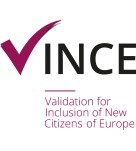 European Commission has adopted (May 2017) the revision of the European Qualifications Framework (EQF) for lifelong learning. The revision makes sure that all types and levels of qualifications are covered, including qualifications from higher education, vocational education and training and general education; but also qualifications awarded by the private sector and international sector organisations.
European Commission has adopted (May 2017) the revision of the European Qualifications Framework (EQF) for lifelong learning. The revision makes sure that all types and levels of qualifications are covered, including qualifications from higher education, vocational education and training and general education; but also qualifications awarded by the private sector and international sector organisations.
The EC is still discussing different approaches to recognition of qualifications of third-country qualifications. An informative panel composed by DG EMPL, DG EAC and DG HOME took place on existing initiatives at EU level on the assessment of skills and recognition of qualifications for third-country nationals. A presentation on empirical evidence on the importance of recognition of qualifications for labour market integration of migrants was followed by presentations focused on the Blue Card Directive, the Skills Profile Tool and the ENIC-NARIC Toolkit.
Commission should assess and evaluate, in cooperation with the member states and after consulting the stakeholders concerned, action taken in response to this recommendation and by 2022 report to the council on the experience gained and implications for the future, including, if necessary, a possible review and revision of this recommendation.
VPL in Higher Education
Transparency and recognition of skills and qualifications is one of the new priorities under the 2015 Joint Report of the Council and the Commission on the implementation of the strategic framework for European cooperation in education and training (ET 2020). That report stresses that the EQF should be further developed in order to make qualifications more transparent and comparable. With regard to newly arrived migrants, it also stresses that existing transparency instruments could help to get a better understanding of foreign qualifications in the Union, and vice versa.
The main features of the EQF, namely its learning outcomes approach, the definition of level descriptors, and the establishment of referencing criteria as developed by the EQF Advisory Group, have been a source of inspiration for the development of national and regional qualifications frameworks throughout the world. An increasing number of third countries and regions are seeking closer links between their qualifications framework and the EQF. The Council of Europe recommends exploring possibilities for the development and application of criteria and procedures to enable, in accordance with international agreements, the comparison of third countries’ national and regional qualifications frameworks with the EQF.
Validation in the Labour Market
European Parliament report (June 2016) stresses that:
- the need for an early, fair, transparent and free-of-charge assessment of refugees’ and asylum seekers’ formal and non-formal skills, as well as recognition and validation of their qualifications, with a view to facilitating their access to active labour market policies, in particular through training and employment guidance, including measures guaranteeing their access to the labour market and to non-discriminatory working conditions, and tailored measures allowing them to make full use of their potential, and to match labour supply and demand in the host countries;
- stresses, in this regard, the importance of strengthening the role of the European Qualifications Framework, and of promptly introducing more effective arrangements for recognising and validating qualifications, experience and skills;
- points out that the EU citizenry as a whole would benefit from such effective arrangements;
- stresses, however, that this assessment should on no account amount to a process of discrimination in relation to asylum seekers’ qualifications, and skills and potential employability should not be a criterion for decisions on asylum applications;
- stresses that the limited resources available should be spent carefully on the timely handling of asylum procedures and on the speedy and effective integration of refugees
Validation in the Third Sector
No unified approach at EU level.
Funding of VPL
For the moment the funding remains largely national competence. Different European funding are available in order to map better different approaches across the EU and developing common frameworks, cooperation for innovation and the exchange of good practices.
References (All accessed on 19th of June 2017)
- The European Qualifications Framework (EQF) helps in comparing national qualifications systems, frameworks and their levels to make qualifications more readable and understandable across different countries and systems in Europe
- EP report On refugees: social inclusion and integration into the labour market
More Information
- Documents about validation in different European countries in the VINCE library

